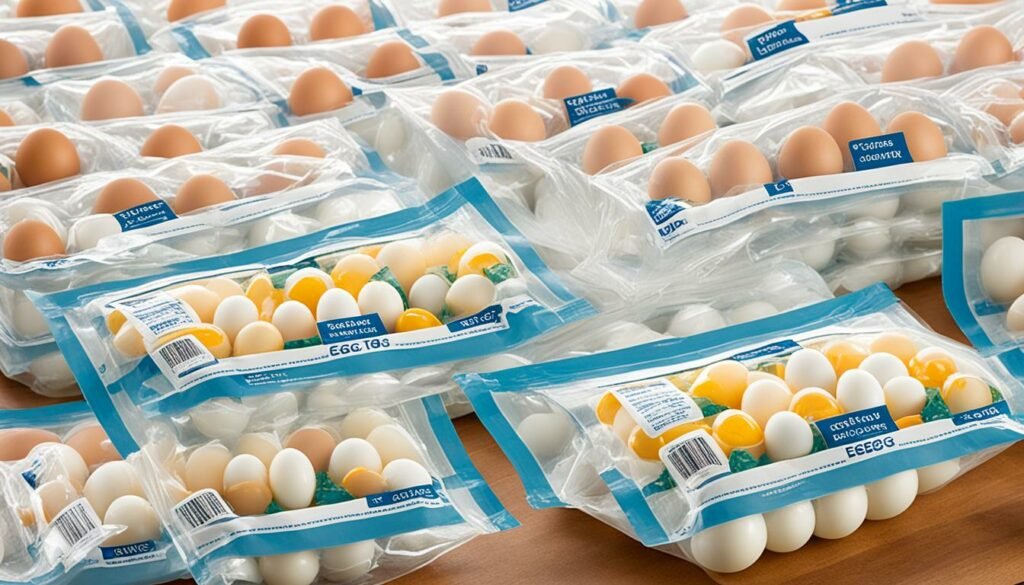After visiting my aunt’s rural homestead, I found myself with a bounty of farm-fresh eggs. This abundance led me to ponder how to extend their shelf life. The concept of vacuum sealing raw eggs caught my attention.
My curiosity led me to delve deeper into this method. Could vacuum sealing indeed prolong the life of raw eggs? The prospect of keeping eggs fresh for months seemed too remarkable to ignore. Through my research, I uncovered a plethora of techniques for preserving eggs over an extended period.
Let’s explore the intricacies of vacuum sealing raw eggs together. This method is essential for anyone looking to keep their eggs fresh, whether you’re a backyard chicken enthusiast or a regular grocery shopper. This guide aims to equip you with the knowledge to effectively store your eggs.
Understanding Raw Egg Storage Methods
Preserving freshness is crucial when it comes to egg storage. Let’s delve into the realm of raw egg storage. We’ll explore methods to keep our eggs safe and fresh for extended periods.
Traditional Egg Storage Techniques
I’ve always turned to refrigeration for storing eggs. Keeping them in their cartons in the fridge helps maintain their quality. However, some still prefer coating eggs in mineral oil or storing them in lime water. These methods can be effective but require careful handling to ensure safety.
Benefits of Long-Term Egg Preservation
Extending the freshness of eggs offers numerous advantages. It reduces waste, saves money, and ensures a steady supply for baking or cooking. Moreover, proper preservation helps maintain their nutritional value for a longer time.
Challenges of Storing Raw Eggs
Storing raw eggs comes with its own set of challenges. These include:
- Preventing bacterial growth
- Maintaining egg quality over time
- Avoiding moisture loss and freezer burn
These issues have prompted me to look into advanced techniques, such as vacuum sealing frozen eggs. This method can greatly extend their shelf life.
Can You Vacuum Seal Raw Eggs?
Vacuum sealing raw eggs is feasible, but it demands a specific approach. Freezing eggs first is the optimal strategy. This method ensures the eggs’ quality and prevents the whites and yolks from becoming rubbery during sealing.
Freezing eggs before vacuum sealing brings numerous advantages for packaging. It simplifies portioning, making it ideal for diverse raw egg recipes. This method allows me to keep my eggs fresh for up to a year, extending the typical six-month shelf life for frozen eggs.
| Storage Method | Shelf Life | Convenience | Best For |
|---|---|---|---|
| Refrigeration | 4-5 weeks | High | Short-term use |
| Freezing | Up to 6 months | Medium | Long-term storage |
| Vacuum Sealed (Frozen) | Up to 1 year | High | Extended storage, meal prep |
By integrating freezing and vacuum sealing, I’ve found a superior method to prolong egg shelf life and preserve quality for various recipes. This approach has transformed my egg storage and meal planning strategies.
The Process of Freezing Eggs for Vacuum Sealing
Freezing raw eggs is a vital step in preserving them for a long time. It’s essential to prepare and freeze them correctly for successful vacuum sealing. Let’s delve into the best methods for freezing eggs to keep them fresh for months.
Preparing Eggs for Freezing
I begin by cracking fresh eggs into clean containers. For whole eggs, I mix them gently until they’re just combined. If I’m freezing whites and yolks separately, I separate them with care. This step is crucial for maintaining egg quality during the freezing process.
Using Silicone Molds or Ice Cube Trays
I find silicone molds ideal for freezing eggs because they make removal easy. If I don’t have silicone molds, ice cube trays are a good alternative. I lightly spray the trays with cooking oil to prevent the eggs from sticking. Freezing one egg per compartment helps with portion control.
Freezing Time and Temperature Considerations
The freezing time depends on your freezer’s temperature. I usually freeze eggs for about 4 hours or until they’re fully solid. It’s crucial to freeze them quickly at 0°F (-18°C) or below. This rapid freezing helps preserve the eggs’ quality and texture.
| Egg Type | Freezing Method | Freezing Time | Storage Duration |
|---|---|---|---|
| Whole Eggs | Beaten, in molds | 4 hours | Up to 12 months |
| Egg Whites | Separate, in trays | 3-4 hours | Up to 12 months |
| Egg Yolks | With salt, in molds | 4-5 hours | Up to 6 months |
By adhering to these preservation techniques, you’ll have perfectly frozen eggs ready for vacuum sealing and long-term storage.
Vacuum Sealing Frozen Eggs: Step-by-Step Guide
Vacuum sealing frozen eggs is an effective method for long-term storage. I will guide you through the process, from selecting the right materials to sealing your eggs effectively.
Choosing the Right Vacuum Sealer Bags
For optimal results, choose durable, leak-proof vacuum sealer bags. These bags are essential for safeguarding your eggs during the vacuum sealing process. Opt for bags designed for freezer use to prevent freezer burn.

Packaging Frozen Eggs for Vacuum Sealing
After freezing your eggs, it’s time to package them. I suggest placing 8-12 frozen eggs in each bag, based on their size. Ensure the eggs are fully frozen before sealing to avoid damage during the vacuum sealing process.
Tips for Successful Vacuum Sealing
To ensure successful vacuum sealing of your frozen eggs, follow these guidelines:
- Ensure eggs are fully frozen before sealing
- Add a protective layer of egg juice or water on top of frozen eggs to prevent freezer burn
- Remove all air from the bags during the vacuum sealing process
- Double-check seals for any leaks or gaps
| Vacuum Sealing Step | Key Points |
|---|---|
| Bag Selection | Use sturdy, leak-proof freezer bags |
| Egg Quantity | Package 8-12 frozen eggs per bag |
| Freezing | Ensure eggs are completely frozen |
| Protection | Add layer of egg juice or water on top |
| Sealing | Remove all air during vacuum sealing |
By adhering to these steps, you will excel in vacuum sealing and maintain your eggs’ freshness for months.
Best Practices for Storing Vacuum Sealed Eggs
Proper storage conditions for eggs are vital for quality and safety. I’ve found several effective ways to keep frozen eggs organized and extend their shelf life. Let’s delve into the best practices for storing vacuum sealed eggs.
Optimal Freezer Conditions
For superior results, store vacuum sealed eggs in a deep freezer at a consistent temperature of 0°F (-18°C) or below. This maintains optimal preservation and avoids freezer burn. I suggest using a separate freezer if possible, as it minimizes temperature fluctuations from frequent opening and closing.
Labeling and Organizing Your Egg Stash
Labeling is crucial when organizing frozen eggs. I always label each bag with the freezing date and the number of eggs. This approach helps me monitor freshness and use older eggs first. For efficient storage, I arrange the bags flat in the freezer, making them easy to stack and access later.
Maximizing Shelf Life of Vacuum Sealed Eggs
To extend the shelf life of vacuum sealed eggs, follow these tips:
- Thaw frozen eggs slowly in the refrigerator to maintain texture
- Use within a year for best quality, though properly sealed eggs can last longer
- Avoid adding salt or sugar before freezing, as it can affect recipe outcomes
- Keep eggs away from strong-smelling foods in the freezer
By adhering to these guidelines, you can ensure your vacuum sealed eggs remain fresh and ready for use whenever needed.
Conclusion
I’ve delved into the realm of egg preservation, and I’m thrilled to reveal that vacuum sealing raw eggs revolutionizes long-term storage. This approach, which involves freezing eggs before vacuum sealing, extends their shelf life to a year or more.
It’s an ideal solution for backyard chicken enthusiasts or anyone stocking up during egg sales. Vacuum sealing isn’t just about cost savings; it ensures the eggs remain in top condition and avoids freezer burn. Moreover, it simplifies portioning when you’re ready to use them.
The secret to success hinges on precise freezing and sealing techniques. With this method at your disposal, egg waste becomes a thing of the past. So, why not experiment with it? Your future self will appreciate the perfectly preserved eggs, ready for delicious meals anytime.
FAQ
Can you vacuum seal raw eggs?
Indeed, vacuum sealing raw eggs is possible. However, it’s advisable to freeze them first. This step prevents the whites and yolks from becoming rubbery during the vacuum sealing process.
What are the benefits of vacuum sealing eggs?
Vacuum sealing frozen eggs enhances their quality and prevents freezer burn. This method allows for extended storage of up to 12 months or more. It also simplifies portioning and enhances versatility in various recipes.
How do you prepare eggs for freezing before vacuum sealing?
Begin by cracking the eggs into silicone molds or ice cube trays, with one egg per space. Freeze these for approximately 4 hours or until they solidify. Silicone molds are ideal for effortless removal, although ice cube trays coated with cooking spray can also be used.
What type of bags should you use for vacuum sealing frozen eggs?
Opt for sturdy, leak-proof vacuum sealer bags for optimal results. Fill each bag with 8-12 frozen eggs, contingent on the bag’s size. Ensure the eggs are fully frozen before sealing to avoid any damage.
How should you store vacuum sealed eggs?
Store vacuum sealed eggs in a deep freezer at a consistent temperature. Mark the bags with the freezing date and egg count. Arrange the bags flat in the freezer for efficient storage.
How long can vacuum sealed eggs be stored?
When stored correctly in a deep freezer, vacuum sealed eggs can last up to a year or more. Always thaw them slowly in the refrigerator before consumption.
